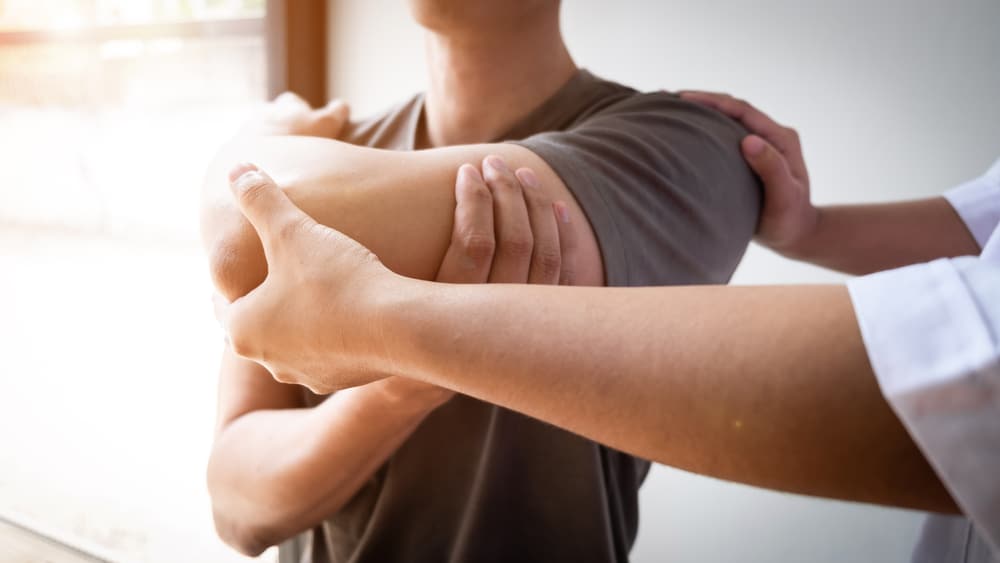Rotator cuff pain that may be barely noticeable during the day can be absolutely brutal at night. Since restful sleep is a crucial part of the healing process of the body, it’s of utmost importance to find a way to resolve the pain so you can get a restful night of sleep. During the night as you are sleeping, your body is working hard to repair itself. It does this by releasing hormones and proteins that help damaged tissues and muscles heal. When you are unable to sleep, the healing process is slowed down. A torn rotator cuff may cause pain at night that hinders your sleep schedule. Nighttime relief for rotator cuff pain can be achieved in several ways, but first, we will look at the reasons you experience shoulder pain at night.
What Causes Rotator Cuff Pain?
A rotator cuff is a group of tendons and muscles that attach to the bones of the shoulder, allowing it to move as it should. When the rotator cuff is damaged due to overuse or injury, it can cause be extremely painful. A torn rotator cuff may be the cause of your shoulder pain that may also go down your arm to the elbow, limiting the movement of the shoulder.
Why Is Rotator Cuff Pain Worse at Night?
Rotator Cuff pain always seems to be worse at night. This is due to the inflammation associated with the injury. The area is compressed while lying down, making your shoulder hurt and feel stiff. You make also experience muscle spasms, numbness, or tingling that hinders you from getting a good night of rest.
Symptoms of a Torn Rotator Cuff
A torn rotator cuff can cause pain that may vary in intensity but doesn’t completely go away. The pain is the most severe when lifting the arms above the head. The most common symptom of a torn rotator cuff is pain is in the shoulder. However, it can also cause other symptoms such as weakness in the arm, difficulty performing everyday activities due to the pain in the shoulder, and rotator cuff pain at night that affects your ability to get a good night of rest.
What Causes a Torn Rotator Cuff?
Rotator cuff tears can be caused by an injury to the shoulder or by the wear and tear on the shoulder tendon through the normal aging process. Repetitious activities or activities that require heavy lifting may cause damage to the rotator cuff.
 Risk Factors Associated with Rotator Cuff Injury
Risk Factors Associated with Rotator Cuff Injury
The following factors may increase your risk of having a rotator cuff injury.
Genetics
Those individuals who have a family history of rotator cuff injuries may be more likely to experience the condition themselves since genetics are a component involved in the development of the injury. Rotator cuff injuries are common in certain families.
Career
Certain occupations, such as construction jobs that require repetitive arm motions, can damage the rotator cuff. Painters or carpenters are likely to suffer from rotator cuff injuries since they often lift heavy objects overhead or require repetitive arm motions.
Aging
As people age, the risk of injury to a rotator cuff increases. Torn rotator cuffs are more common in people who are over 40 years old.
Sports
High-impact sports that use repetitive arm motions such as baseball or golf can wear out the tendons in the shoulder. This leads to an increased risk of developing a rotator cuff injury. Any activity that causes the shoulder to be overextended can cause the rotator cuff to develop a tear.
 How Can I Prevent a Rotator Cuff Injury?
How Can I Prevent a Rotator Cuff Injury?
Although it’s not always possible to prevent rotator cuff tears, there are a few ways to lessen the chance of developing an injury. Some of the following may decrease your risk of developing a rotator cuff injury:
Warm-up
By warming up your shoulder before performing any exercise or task that may require you to use your shoulder for an extended period of time, you can help prevent injury to this area.
Exercise
Performing shoulder strengthening exercises is a great way to prevent injury. Regular exercise is an important factor in reducing the risk of a rotator cuff tear since exercise strengthens both muscles and bones.
Nutrition
By eating nutritious foods, your body can function at optimal levels. When the body is lacking in certain vitamins and minerals, the bones and tendons are more likely to be injured.
Rotator Cuff Pain Relief Treatments
The most common treatments for torn rotator cuff pain relief include anti-inflammatory medications, cortisone injections, physical therapy, or surgery to repair the torn rotator cuff. However, most of the time, rotator cuff pain can be resolved with more conservative methods, and surgery is not required for rotator cuff pain relief.
Ways to Get Nighttime Relief for Rotator Cuff Pain
There are several ways to manage rotator cuff pain by adding a variety of exercises and stretches to your daily routine. However, healing takes time. While you’re waiting for rotator cuff injury to heal, the pain can be extreme, especially at night. Here are several ways to relieve rotator cuff pain at night.
Heat or Ice Therapy for Rotator Cuff Pain Relief
Applying heat or ice to your shoulder can help relieve rotator cuff pain at night. Heat may work better for some individuals in relieving rotator cuff pain at night since it tends to soothe the area and increase blood flow. Try applying a heating pad to your shoulder for 15 minutes at a time as you begin your bedtime routine. Alternate 15 minutes of heat and 20 minutes off while winding down in the evening. Make sure you don’t fall asleep with the heating pad on.
Icing the shoulder is another great way to help relieve rotator cuff pain at night. Ice helps reduce inflammation when applied to an injury. Once again, try 15 minutes of ice and then 20 minutes off.
Alternating between hot and cold therapy is another option since cold therapy helps alleviate inflammation and warm compression helps increase blood flow to the area.
Try a Different Sleeping Position for Rotator Cuff Pain Relief
Rotator cuff sleeping positions can make a big difference in achieving pain relief for a better night of rest. Several positions can help relieve rotator cuff pain, so if one isn’t comfortable for you, try another so you can get much-needed rest. Just as there are positions that can be helpful for rotator cuff pain relief, there are some that can make the pain worse. We have a list of several to try and some to avoid.
Try Sleeping on Your Opposite Shoulder
For those who find it hard to sleep on their back, sleeping on your side may be a better rotator cuff sleeping position for pain relief. Sleep on the shoulder that isn’t causing you with the injured shoulder facing up. You can place a pillow in front or behind you to help keep you from turning over in your sleep.
Try Sleeping in a Reclined Position
Sleeping in a reclined position is another rotator cuff sleeping position that may help reduce pain at night since less pressure is put on the shoulder than while lying flat on your back. Sleeping in a recliner is a good option since it puts your body at a 45-degree angle. Another way to achieve this is by using pillows to help prop you up.
Try Sleeping with Your Shoulder Propped Up
Sleeping flat on your back can make shoulder pain worse at night. However, if you use pillows to prop the arm and shoulder up as you rest, this can help relieve rotator cuff pain at night. Some individuals find relief from rotator cuff pain by just popping the arm up, while others may need to place a pillow under the shoulder. Test out what rotator cuff sleeping position works best for you so you can get plenty of much-needed rest.
Rotator Cuff Sleeping Positions to Avoid for Pain Relief
Avoid Sleeping Flat on Your Back
When the elbow touches the bed while lying flat on your back, it can be just enough to put a strain on your shoulder, causing rotator cuff pain. Supporting your arm by lifting it so that it’s lined up with the rest of your body will help relieve rotator cuff pain at night. If you sleep on your back, always make sure to put a rolled-up towel, blanket, or pillow underneath your arm to achieve nighttime relief for rotator cuff pain.
Avoid Sleeping on Your Stomach
When you sleep on your stomach, it is almost impossible to achieve the right position for relieving rotator cuff pain. The stomach sleeping position typically puts your arms and shoulder in a less than ideal position for relieving rotator cuff pain.
Stretch the Shoulder for Rotator Cuff Pain at Night
Stretching the shoulder during the day and before bed can help strengthen the rotator cuff and also help with the healing process. When you stretch the muscles, you shouldn’t experience pain. Exercise programs such as Yoga or Pilates can also be a great way to relieve shoulder pain at night. Setting aside just 15 to 30 minutes during the day can go a long way toward a good night of rest and relieve rotator cuff pain at night.
Stretches to Try for Nighttime Relief for Rotator Cuff Pain
Here are several stretches that may be beneficial for the relief of rotator cuff pain at night. Make sure you stop the stretch immediately if you experience pain.
- Doorway shoulder stretch
- Side-lying external rotation
- High-to-low rows
- Reverse fly
- Lawnmower pulls
Pain Medications for Rotator Cuff Pain Relief
Sometimes it’s necessary to take medication for rotator pain relief at night. When sleep is interrupted consistently, it can be hard to function during the day. There are several medication options for pain relief that may help you get the rest you desperately need so your body can heal.
Over-the-Counter Medications
Pain relievers such as Tylenol, Advil, or Aleve can help ease pain associated with a rotator cuff injury. Advil and Aleve are nonsteroidal anti-inflammatory drugs (NSAIDS) that can help reduce levels of inflammation in the body leading to a better night of rest. To best achieve nighttime relief for rotator cuff pain, be sure to take the medication about half an hour before you lie down. Make sure to consult with your physician to be sure the medication is ok for you to take, especially if you have any other health issues or are taking any other medications.
Pain-relieving Gel or Cream
Topical gel or cream is another option for nighttime relief for rotator cuff pain. Apply a cream or gel to the shoulder about 30 minutes to an hour before bedtime for best results. Creams such as Aspercreme, Bio freeze, and Voltaren are over-the-counter topicals that may help with nighttime rotator cuff pain.
Care for Your Shoulder Pain Throughout the Day
What you do throughout the day can affect how well you’re able to sleep at night. Some of the ways to prevent your rotator cuff pain from keeping you awake at night are small habits that can have a big impact on relieving rotator cuff pain at night.
Self-care for rotator cuff pain relief include the following:
- Avoid carrying a bag, child, or anything over 10 pounds on one side of your body
- Stretch regularly throughout the day
- Sit up straight and maintain good posture
- Avoid activities that require repetitive lifting over your head
- Take breaks from repetitive activities
- Don’t sleep in the same position every night, alternate sides
- When carrying objects, make sure you are carrying them close to your body
When to See a Doctor for Rotator Cuff Pain
While some pain may be relieved by conservative treatment, oftentimes, an injury is more serious and may require more attention. If you experience excruciating pain, swelling, difficulty raising the arm, or trouble sleeping on your arm for more than a few days, it’s important to consult your doctor. These symptoms may be a sign of a more serious injury.





